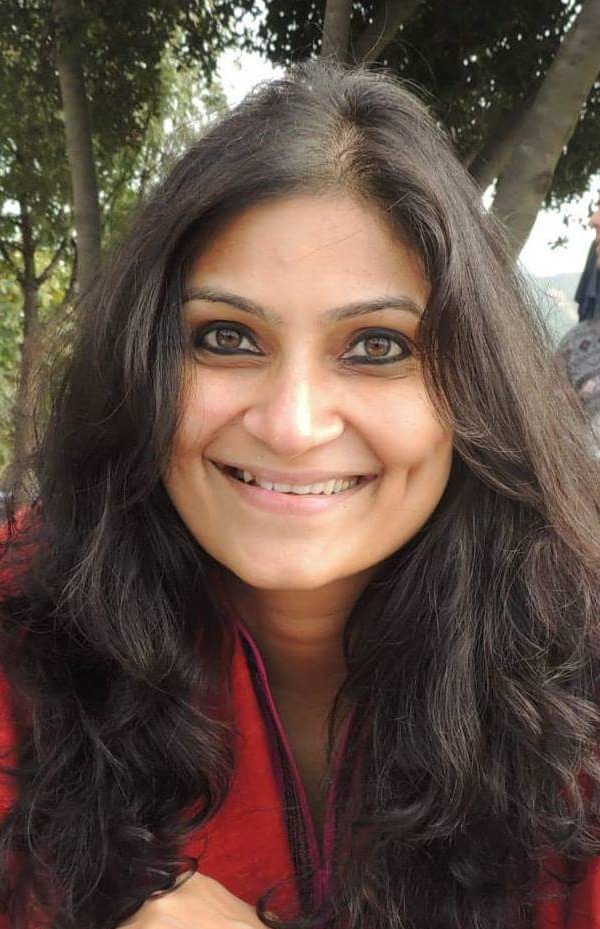Meet Porcia. I’d like you to picture yourself in her shoes.
“Honestly, some days it just feels like you’re standing on a shore looking at a tsunami approaching and there’s only so much you can do. You hear about people suffering and dying from Covid-19 but it’s a whole different thing to see it first hand, up close and personal. This virus does not discriminate. Irrespective of your age, religion, caste, creed, skin colour, rich or poor, even the little children, there’s no guarantee that you will not get it. The proportion of patients that are critically ill… is overwhelming.
It is exhausting and stressful, and not to forget scary. But putting our fears aside, we show up every day, no matter what. We get worn out, and it requires a lot of mental strength to deal with what we have to handle every day. As a healthcare professional, life and death is a part of the work we do. But to witness as many as three-four deaths in a shift you work in, it does take a toll on your mental well-being.
The worst part of Covid-19 is that the patients die alone without their families by their side. Just imagine that you’re dying alone and you’re not able to say goodbye one last time to your parents, grandparents, son, daughter, or really anybody who cares about you. It is heart-breaking.
I don’t know if going into the next shift will make me contract the virus. The possibility is always there because there is nothing that differentiates any of us from the people who are devastatingly sick.
We are out there trying to fight the virus when nobody else can. What makes me show up to work, you ask? I honestly love what I do. And I am so happy to give my best, be healthy, and be able to help. ”
Who is Porcia? She is a nurse assigned to a dedicated Covid ward in one of the most reputed hospitals of the country, where she is currently working 12-hour shifts. I reflected on what she had just shared with me. Here was someone who was working on the frontlines of providing care to people infected with the coronavirus. She had just returned from a long, grueling shift, but was willing to share her story with me, with a calmness and serenity that pierced my heart.
I saw a photograph of her face, fatigue writ large in her eyes, the skin deeply etched with the imprints of the harsh face mask, a part of the Personal Protective Equipment (PPE) kit. But her dimpled smile gave away the fact that she was, in fact, not putting on a mask at all. She was just who she was. But who exactly is Porcia? And what can we learn from her?
What lessons in mental grit and strength could the rest of us imbibe from these compassionate health care professionals (HCPs) who have been tested and tried, personally and professionally these past few months?
Here are five that I’d like to share with you.
1. Resilience
They demonstrate the psychological capacity to adapt to stressful circumstances and bounce back from adversity. They shine through, and how. In their ability to sustain their focus and determination in serving their patients with dedication, under the most difficult situations. In the composure they show when neighbours fear their return home as being potential carriers of the virus. These professionals march on resolutely.
Here’s the thing though. Resilience is not an innate trait that you either have or don’t have. It’s a psychological skill you can acquire. For people like Porcia, it comes from living a value-based, meaningful life; from having the tenacity, optimism, persistence, solution-focused coping, maintaining a sense of calm and equilibrium, and drawing on their support group and networks to continue to serve people, despite the challenges thrown at them. And there are challenges aplenty: lack of infrastructure, threat to their own safety and health, balancing their own fears towards their family and making the right choices, and the stigma they are subjected to.
They show us that they have the capacity to maintain their core purpose and integrity, their power to pick themselves up after a fall, and to thrive when faced with the most drastic circumstances. How are you cultivating the skill of resilience?
2. Self-care
Being a part of the healthcare fraternity for more than two decades now, and as someone who promotes a proactive approach to well-being, I have seen that the most common reason doctors cite as not being able to focus on their well-being is a paucity of time. They had families to take care of, kids to drop to school, and long schedules at work, sometimes for 12 hours or more.
It’s not just the bodies they take care of, but the minds and hearts too, and it’s no surprise that compassion fatigue looms over their heads but gets assimilated as an “occupational hazard” instead of being dealt with.
In this pandemic, they have made it a priority to take care of their own health so that they don’t compromise their own immunity. They manage their own individual stressors effectively, eat nutritious meals, exercise, engage in mindfulness and breathing relaxation techniques, and even pursue hobbies when they can.
On her days off from being a nurse at the Covid ward, Porcia loves to cook, read, listen to music, and sew. It’s not distraction, nor is it selfishness. It’s nurturing herself. How many of us take the time out to nurture ourselves on a daily basis?
3. Compassion
Their hearts break when they see their patients become ill and die alone. These carers do their best to ease their patients’ suffering. In other words, they demonstrate exactly what compassion is all about: to look beyond your own pain to see the pain of others. Their worries could have doubled when their colleagues started acquiring the infection, but they provided them with sage advice and counsel. We know of their conviction to serve others before their own kin and selves. It was always others before themselves and their own.
I reflected on Porcia’s gentle demeanour, and was reminded of a quote I had read somewhere: “Nurses dispense comfort, compassion, and caring without even a prescription.” How true it rang in these current times. How are you practising compassion every day?
4. Having a purpose and a meaningful life
Our being human itself makes us seek validation and meaning of our place in the bigger picture. How many of us live a life that is fuelled by a sense of purpose, that is in sync with the values that define us? A meaningful life is multidimensional, comprising three components: comprehension (feeling as though one’s life makes sense), purpose (feeling directed and motivated by valued goals), and mattering (feeling that one’s existence is significant).
Despite the current challenges posed by the pandemic, these HCPs never lose sight of why they do what they do and make their purpose their daily motivation. How are you living a life of purpose on a regular basis?
5. Confronting mortality
In confronting so many others’ mortality on a daily basis, these HCPs demonstrate the kind of courage it takes to confront one’s own mortality. Before each shift that Porcia went into, she wondered if it would be her last. What would make her—and others like her—take that stand? Was it just the allegiance to the Hippocratic Oath to treat the ill to the best of one’s ability, still held sacred? Was it to provide for their family that made these medical and paramedical staff show up for work despite the threat to their own mortality?
The words of Atul Gawande from his book Being Mortal resonate here more than ever: “People readily demonstrate a willingness to sacrifice their safety and survival for the sake of something beyond themselves, such as family, country, or justice.” How are you strengthening yourself to confront your anxieties to begin with?
In sharing with you the lessons that Porcia and her compassionate ilk teach us, I will return you once again to where we started: Can you picture yourself in her shoes?


